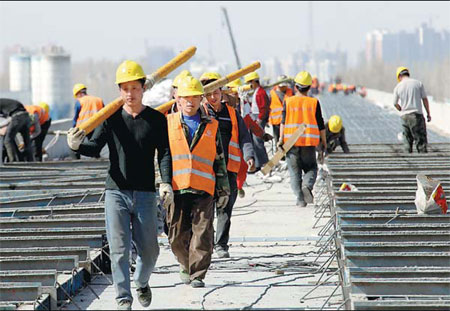Reorganized railways an engine for reform
Updated: 2013-04-11 07:44
By Xu Wei (China Daily)
|
||||||||
Unlike in the United States and many European countries, where the reliance on trains has fallen over the years largely due to a boom in air travel, China's railways still make a "fundamental contribution to the economy and society," said Zhao Xu at the Unirule Institute of Economics.
Stretching 98,000 kilometers, the network is the second largest in the world. Four billion metric tons of cargo are shipped on its tracks every year, including, according to a recent People's Daily report, as much as 85 percent of wood and crude oil supplies and almost 1.7 billion metric tons of coal.
A source with the NDRC said the network employs an estimated 2 million workers, and in 2012 handled 1.9 billion passenger journeys.
It is this lingering dependence on the railways that has led to the cautious tone among many industry insiders.
Late Chinese leader Deng Xiaoping, who identified rectifying the railway system as a key measure to stimulate a stagnating economy during the "cultural revolution" (1966-1976), compared China's reform to "crossing the river while feeling the stones."
But for transport researcher Zhang, there will be no stones to feel. "This reform will be one of trial and error; there is no roadmap," he said, explaining that China cannot follow the model of another country because a railway is unique to each nation's economic development. "We're in uncharted waters here."
Massive debts
In March, the State Council released a statement setting out the duties of the new corporation: Railway dispatch and command, freight and passenger business management, construction and maintenance, and taking charge of 18 railway bureaus nationwide, three transport companies and all other assets owned by the now defunct Ministry of Railways.

 Li Na on Time cover, makes influential 100 list
Li Na on Time cover, makes influential 100 list
 FBI releases photos of 2 Boston bombings suspects
FBI releases photos of 2 Boston bombings suspects
 World's wackiest hairstyles
World's wackiest hairstyles
 Sandstorms strike Northwest China
Sandstorms strike Northwest China
 Never-seen photos of Madonna on display
Never-seen photos of Madonna on display
 H7N9 outbreak linked to waterfowl migration
H7N9 outbreak linked to waterfowl migration
 Dozens feared dead in Texas plant blast
Dozens feared dead in Texas plant blast
 Venezuelan court rules out manual votes counting
Venezuelan court rules out manual votes counting
Most Viewed
Editor's Picks

|

|

|

|

|

|
Today's Top News
Boston bombing suspect reported cornered on boat
7.0-magnitude quake hits Sichuan
Cross-talk artist helps to spread the word
'Green' awareness levels drop in Beijing
Palace Museum spruces up
First couple on Time's list of most influential
H7N9 flu transmission studied
Trading channels 'need to broaden'
US Weekly

|

|








